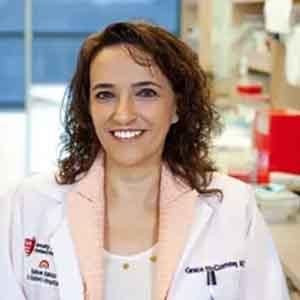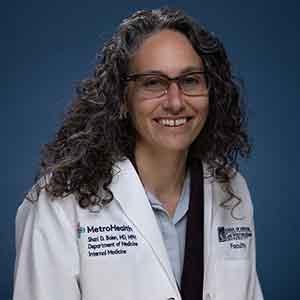Grace McComsey, MD, initially aspired to be an engineer before discovering her true passion for medicine. Shari Bolen, MD, was driven to become a doctor after witnessing the effects of illness on her family. Now, both serve as accomplished leaders at Case Western Reserve School of Medicine and are sharing their experiences on National Women Physicians Day (Feb. 3) as women's achievements, resilience and contributions in medicine are celebrated.
Answers have been lightly edited for clarity and length.
Grace McComsey, MD, FIDSA
Vice Dean for Clinical and Translational Research
Director, Clinical and Translational Science Institute
Principal Investigator, Clinical and Translational Science Collaborative of Northern Ohio
The Gertrude Chandler Tucker Professor of Pediatrics and Medicine, CWRU
Research Integrity Officer, Senior Faculty, Pediatric and Adult Infectious Diseases, University Hospitals Health System
What inspired you to pursue a career in medicine, and what (if any) challenges did you overcome as a woman in this field?
Growing up in Lebanon, I wanted to be an engineer. My parents pushed me to become a doctor. I took the national medicine exam just to prove to them that I could easily become a doctor, even though I did not want to pursue the career. I passed (in top 1%) and my parents continued to push. They saw my compassion for people and understood that I would be more fulfilled in work focused on health and well-being. They were right. In many ways, my interest in engineering is present in my work. I am constantly working to make systems better to serve people faster.
How do you see the role of women in medicine evolving, and what progress still needs to be made?
Please note that women have been in science all along and we are just now elevating and sometimes unearthing the breadth and depth of their contributions. That said, it is crucial to have women in science and medicine. Every time someone new enters this field, they bring new perspectives and experiences that advance medical practice. As scientists, we often see problems from new angles because we are operating in systems we did not necessarily design; therefore, we often problem-solve quickly to do jobs well. This supports innovation. As bedside clinicians—often because women are still caretakers in their homes and communities—we can bring a therapeutic approach that is more encompassing of family circumstances and what the patient needs after leaving the hospital.
Can you share a moment in your career that made you especially proud to be a woman in healthcare?
As an infectious disease doctor, I have had the privilege of caring for HIV patients for over two decades. When I started, many patients had a poor prognosis, and we did not expect them to live. Now, many of these patients are still alive, living a productive and satisfying life. When I see them, they honor my care by telling me, “I am here because of you.” That is deeply fulfilling.
What advice would you give to young women aspiring to become physicians?
I have mentored many doctors and clinicians in training. I specifically enjoy mentoring young women because I can provide the perspective of a doctor and researcher who has a thriving professional life and a fulfilling family life. Our drive for excellence can feed our professional and personal ambitions. We can also draw like-minded individuals around us to fully support our collective goals as science professionals and members of families and communities.
Shari Bolen, MD, MPH
The Alfred F. Connors Sr. Health Services and Population Health Professor
Professor of Medicine, CWRU
Founding Director, Population Health and Equity Research Institute, The MetroHealth System
Director, Center for Health Care Research and Policy
The MetroHealth System and Case Western Reserve University
What inspired you to pursue a career in medicine, and what (if any) challenges did you overcome as a woman in this field?
I decided to pursue a career in medicine since I wanted to be part of a helping profession, and enjoyed learning how the body and mind work in relation to health. I also experienced family members with health conditions and wanted to pursue ways to improve care. As a woman, patients will often assume we are nurses, and people (colleagues, staff, and patients) sometimes assume we know less than men in our field.
How do you see the role of women in medicine evolving, and what progress still needs to be made?
Women are admitted to medical school at similar rates as men now and are valued by others more now than in the past. Salaries are still higher for men and leadership positions are still more frequently given to men, so there is some work to do in that space.
Can you share a moment in your career that made you especially proud to be a woman in healthcare?
This is a hard question since I don’t often think about being a woman in healthcare and just think about the work to improve the care that we are doing. The work I am most proud of relates to projects where we have had a meaningful impact on the health of communities we serve, and not what sex or gender I am. I am glad that I can serve as a woman in leadership to provide a model of these activities for other women in healthcare who might wonder if they are able to serve in leadership roles.
What advice would you give to young women aspiring to become physicians?
Work hard—diligence and dependability are critical. Apply for leadership positions even if you think you might not be ready. You will learn on the job. And, learn how to negotiate for important areas at work



